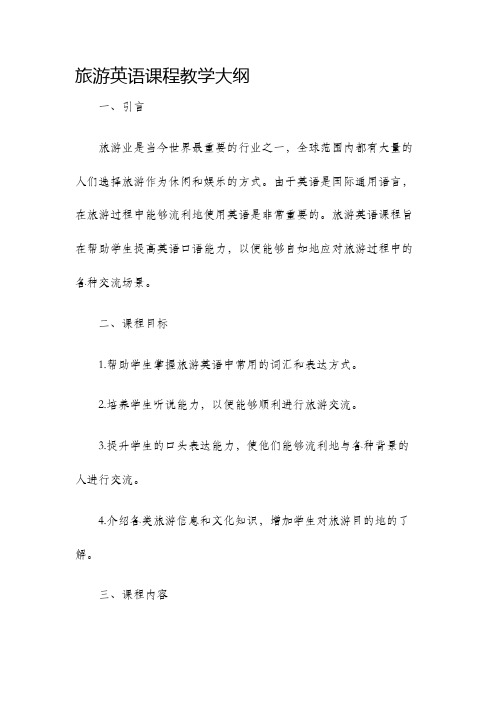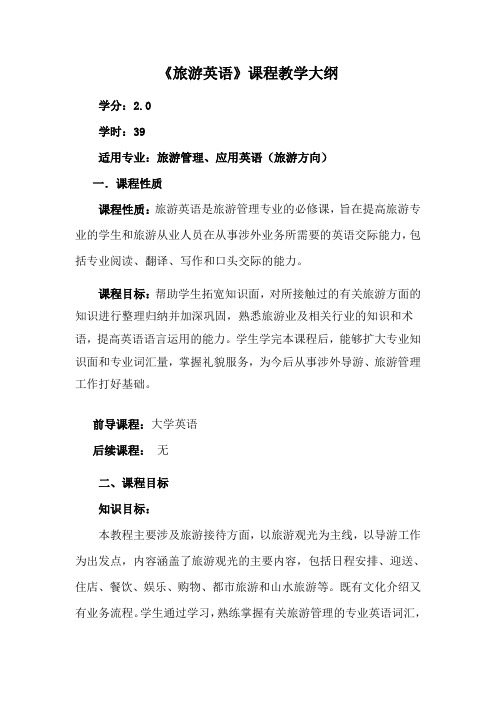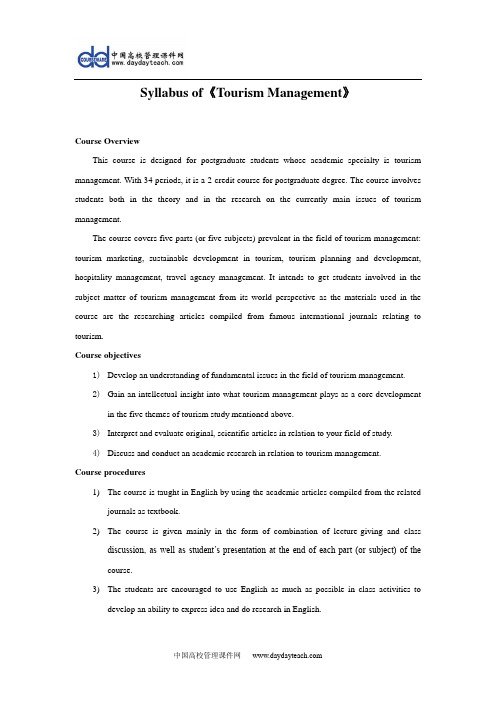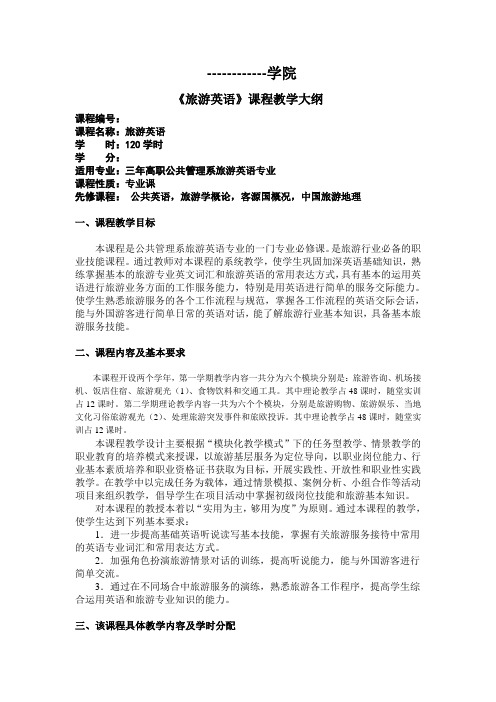旅游管理英语课程教学大纲
旅游专业英语教程大纲

《旅游专业英语》教学大纲旅游管理及涉外旅游管理专业适用一.课程的性质与任务本课程是涉外旅游及旅游管理专业学生的专业核心职业能力模块的课程。
本课程主要任务是培养、训练学生在旅游工作环境下英语听、说、读、写、译语言能力;并掌握系统的旅游、导游基础知识;熟悉了解国内外丰富的旅游资源。
该课程通过听、说、读、写、讨论、解决问题和角色扮演等教学手段培养学生从事旅游或涉外旅游管理专业所需的英语听力、口语、阅读理解和写作的基本专业英语技能。
通过教学,不仅要让学生全面了解旅游行业服务人员在各种相关涉外工作背景下,如:机场、旅行社、导游、酒店等常见的规范英语表达范例和常用表格、旅游文书写作指南,还要让学生从多角度了解中国灿烂的传统文化精髓。
此外,还应注重对学生进行中西方文化知识拓展和综合素质训练所涉及的知识结构,如:历史文化,民族民俗风土人情和社交礼仪等知识。
课程的基本要求和教学目的1、听力能力要求:能基本听懂正常语速(每分钟120-160个单词)的一般旅游活动中的电话、对话等,并能结合具体语言环境,理解所听内容的深层含义,把握说话者的态度和意图。
2、阅读能力要求:能读懂中等难度的旅游英语文章,了解作者的观点和态度。
阅读速度为每分钟100-140个单词,理解准确率在75%以上。
3、口语能力要求:能用英语熟练在各种旅游工作场景下与相关人士沟通,解决问题。
语音、语调正确,语流连贯顺畅,表达基本得体。
4、写作能力要求:能够运用所学语言知识,写出符合国际旅游惯例、格式规范的一般性旅游实用文书等。
要能够做到中心思想明确、结构合理、语言得体。
5、英汉互译能力要求:能够翻译一般性旅游阅读材料。
英译汉,要求速度每小时200-250个单词;汉译英,要求速度每小时180-220个汉字。
能够承担一般性旅游活动中的口译工作。
6、词汇要求:认知词汇达到5,000左右单词,熟练掌握其中约2,500个词。
7、综合素质要求:要求学生具有乐观、积极、向上的心理素质和勇于创新、不断更新自身知识体系的精神。
旅游英语课程教学大纲

旅游英语课程教学大纲一、引言旅游业是当今世界最重要的行业之一,全球范围内都有大量的人们选择旅游作为休闲和娱乐的方式。
由于英语是国际通用语言,在旅游过程中能够流利地使用英语是非常重要的。
旅游英语课程旨在帮助学生提高英语口语能力,以便能够自如地应对旅游过程中的各种交流场景。
二、课程目标1.帮助学生掌握旅游英语中常用的词汇和表达方式。
2.培养学生听说能力,以便能够顺利进行旅游交流。
3.提升学生的口头表达能力,使他们能够流利地与各种背景的人进行交流。
4.介绍各类旅游信息和文化知识,增加学生对旅游目的地的了解。
三、课程内容Module 1: 旅游简介1. 旅游行业概述:介绍全球旅游业的规模和发展趋势。
2. 旅游地点介绍:学习如何用英语描述各类旅游目的地的特点和优势。
3. 旅游资源:学习如何描述各类旅游资源,并学习相关词汇和表达方式。
Module 2: 旅游准备1. 旅行计划:学习如何提问和回答有关旅行计划的问题。
2. 预订酒店和机票:学习如何预订酒店和机票,并处理相关的交流场景。
3. 带上必备物品:介绍旅行必备物品,并学习相关词汇和表达方式。
Module 3: 在旅途中1. 在机场和车站:学习与机场和车站工作人员交流的基本句型和用语。
2. 导航和交通:学习如何在陌生的地方使用英语寻找方向和使用公共交通工具。
3. 旅游中的应急处理:通过案例学习如何处理旅游过程中的紧急情况,并学习相关表达方式。
Module 4: 旅游活动1. 参观景点:学习如何用英语描述景点的特点和历史,并学习相关词汇和表达方式。
2. 体验当地文化:学习如何与当地人交流并了解当地文化的相关用语。
3. 美食与购物:学习如何点菜、购物和与服务员交流的相关用语。
四、教学方法1. 听力训练:通过听取旅游相关的对话和短文,提高学生的听力理解能力。
2. 口语练习:通过角色扮演和小组讨论等方式,让学生进行口语表达练习。
3. 阅读和写作练习:通过阅读旅游资料和撰写旅游心得,提高学生的读写能力。
《旅游英语》课程教学大纲

《旅游英语》课程教学大纲学分:2.0学时:39适用专业:旅游管理、应用英语(旅游方向)一.课程性质课程性质:旅游英语是旅游管理专业的必修课,旨在提高旅游专业的学生和旅游从业人员在从事涉外业务所需要的英语交际能力,包括专业阅读、翻译、写作和口头交际的能力。
课程目标:帮助学生拓宽知识面,对所接触过的有关旅游方面的知识进行整理归纳并加深巩固,熟悉旅游业及相关行业的知识和术语,提高英语语言运用的能力。
学生学完本课程后,能够扩大专业知识面和专业词汇量,掌握礼貌服务,为今后从事涉外导游、旅游管理工作打好基础。
前导课程:大学英语后续课程:无二、课程目标知识目标:本教程主要涉及旅游接待方面,以旅游观光为主线,以导游工作为出发点,内容涵盖了旅游观光的主要内容,包括日程安排、迎送、住店、餐饮、娱乐、购物、都市旅游和山水旅游等。
既有文化介绍又有业务流程。
学生通过学习,熟练掌握有关旅游管理的专业英语词汇,掌握常见的英文句型及重点语法,能听懂旅游业的常用英语口语,熟练朗读及拼写,能进行基本的英汉互译,能运用基本正确的英语进行对客交流服务,如:机场迎接游客、入住酒店,游览参观等。
技能目标:通过专题内容的集中训练,学生能够提高涉外旅游服务的英语听、说、读、写技能,能运用基本正确的英语进行对客交流服务。
素质目标:通过学习有关介绍中国文化及山水旅游活动的情景对话和真实语言材料,提高作为旅游工作者的旅游交际能力、文化素质和团队协作精神。
三、教学内容及具体要求Unit 1授课学时:4教学内容: Meeting Guests基本要求:1. To master the work procedure and task for a tour guide to meet guests.2. To make sure what a tour guide should prepare before meeting guests.3. To obtain the following abilities, such as meeting guests,making a welcome speech, transferring guests to the hotel, indicating the travel plan, and explaining scenery alongthe way.Unit 2授课学时:3教学内容:Hotel Check-in基本要求:1.To master the work procedure and content of a tour groupto check in.2.To grasp the importance of checking the schedule.3.To build up the ability of anticipating and dealing withunexpected events during check-in.Unit 3授课学时:3教学内容:Hotel Service基本要求:1.To get familiar with the procedure of catering service.2.To learn the food culture of tour destinations.3.To learn and practice the skills of dish ordering andpayment.Unit 4授课学时:4教学内容:Mountains and Waters Tours基本要求:1. To get familiar with the basic knowledge of mountain andwaters landscapes.2. To learn the skills of presenting mountain and waterslandscapes.3. To improve the ability to make up the guiding speech for mountain and water.landscapesUnit 5授课学时:3教学内容:Garden Tour基本要求:1.To get familiar with the basic knowledge on Chinese gardenlandscapes.2.To learn the skills of presenting Chinese gardenlandscapes.3.To learn to make up the guiding speech Chinese gardenlandscapes.Unit 6授课学时:3教学内容:Temple Tour基本要求:1.To grasp the basic knowledge of religious and culturallandscapes.2.To learn and practice the skills of presenting religiousand cultural landscapes.3.To learn to make up the guiding speech for religious andcultural landscapes.Unit 7授课学时:3教学内容:Mausoleum Tour基本要求:1.To get familiar with the basic knowledge of mausoleum.2.To learn and practice the skills of presenting mausoleum.3.To improve the ability to make up the guiding speech formausoleum tour.Unit 8授课学时:3教学内容: Shopping Service基本要求:1.To get familiar with the service procedure of shopping.2.To grasp the characteristics of local specialties indifferent tourist destinations.3.To know the precautions in the shopping service.Unit 9授课学时:4教学内容:Tourism Entertainment Services基本要求:1.To get familiar with the service procedure.2.To grasp local entertainment programs and characteristicsof them.3.To let the students develop a vocabulary related to thistopic.Unit 10授课学时:3教学内容:Handling Accidents and Complaints基本要求:1.To get familiar with the basic knowledge of travelingaccidents and complaints traveling accidents and complaints.2.To know the procedures of traveling accidents andcomplaints.3.To learn and practice the skills of traveling accidentsand complaints.4.To improve the basic ability to deal with minor accidents. Unit 11授课学时:3教学内容:Seeing off the Tour Group基本要求:1.To get familiar with the basic knowledge of seeing off thetour group.2.To learn the techniques of seeing off the tour group.3.To learn and practice the skills of traveling accidentsand complaints.4.To obtain and practice the ability to make up and deliverthe farewell speech.Unit 12授课学时:3教学内容:Services of Tour Leader基本要求:1.To learn the basic overview of the destination countries.2.To practice communication skills.3.To practice the ability of an independent overseas.4.To improve the ability to deal with emergencies abroad.四、教学手段及方法本课程的教学主要侧重于学生的实践能力,体现教,学,做融为一体,主要是要让学生掌握一些旅游有关的基本技能和技巧,并进行反复的练习,使学生在学习旅游相关知识的同时又提高旅游交际环境中综合应用能力和职业能力。
《旅游(管理)英语》课程教学大纲

《旅游(管理)英语》课程大纲《旅游(管理)英语》课程教学大纲江门职业技术学院外语系公共英语教研室学时数:108 其中:理论教学学时:54 课内实训学时:54先修课:《高职实用英语》后续课:广东省英语导游证考试一、课程的性质、教学目标和任务旅游英语是旅游管理专业的必修课,旨在提高旅游专业的学生和旅游从业人员在从事涉外业务所需要的英语交际能力,包括专业阅读、翻译、写作和口头交际的能力。
通过翻译理论与翻译技巧的学习,不仅考查学生英语综合知识的掌握水平,提高学生的英语实际运用能力。
尤其是通过大量专业旅游资料的翻译练习,使学生既扩宽旅游专业知识面,同时又提高英语水平,逐步掌握旅游专业英语的语言特点及表达方法。
本课程从培养高级应用型人才的总体目标出发,结合学生毕业后的工作实际要求,力求向学生提供未来工作岗位所需要的专业英语知识和技能,培养学生的专业英语交际能力;本课程力求做到基础与专业完美结合、知识与技能有机结合,介绍国际旅游新动态,全面提高学生旅游英语综合应用能力,培养跨世纪专业人才。
二、课程内容和要求(一)教学基本要求:1.要求学生通过学习,熟练掌握有关旅游管理的专业英语词汇,掌握常见的英文句型及重点语法,认真完成课程中规定的各项练习,能听懂旅游业的常用英语口语,熟练朗读及拼写,能进行基本的英汉互译,能运用基本正确的英语进行对客交流服务,如:机场迎接游客、入住酒店,游览参观等,掌握旅游管理专业英语的基本学习方法、技巧;并鼓励学生学会借助工具书独立解决学习中所遇到的各种问题。
2.课程的教学模式因理论课和实践课而异。
(1)理论课按照“一讲、二背、三模拟”的教学步骤,循序渐进,最后达到掌握或熟练运用的目的。
教学以课堂讲授和室内模拟相结合的方式进行。
“一讲”指以教材为主线,向学生进行系统地讲授,让学生理解;“二背”指课后,学生就课堂上所讲的内容按照教师的要求进行背诵(背诵的要旨在理解,死背的东西不能用,也容易遗忘);“三模拟”,对常见的英文句型及重点语法,采用课堂交流与讨论的形式进行练习,加深理解,组织学生进行室内演练、情景表演。
《旅游管理》(英)教学大纲

Syllabus of《Tourism Management》Course OverviewThis course is designed for postgraduate students whose academic specialty is tourism management. With 34 periods, it is a 2-credit course for postgraduate degree. The course involves students both in the theory and in the research on the currently main issues of tourism management.The course covers five parts (or five subjects) prevalent in the field of tourism management: tourism marketing, sustainable development in tourism, tourism planning and development, hospitality management, travel agency management. It intends to get students involved in the subject matter of tourism management from its world perspective as the materials used in the course are the researching articles compiled from famous international journals relating to tourism.Course objectives1)Develop an understanding of fundamental issues in the field of tourism management.2)Gain an intellectual insight into what tourism management plays as a core developmentin the five themes of tourism study mentioned above.3)Interpret and evaluate original, scientific articles in relation to your field of study.4)Discuss and conduct an academic research in relation to tourism management.Course procedures1)The course is taught in English by using the academic articles compiled from the relatedjournals as textbook.2)The course is given mainly in the form of combination of lecture-giving and classdiscussion, as well as student’s presentation at the end of each part (or subject) of the course.3)The students are encouraged to use English as much as possible in class activities todevelop an ability to express idea and do research in English.Course contentsPart 1. Tourism marketingCase one: Cultural tourism in central and eastern Europe: the views of ‘induce d image formation agents’1.1Cultural tourism and its rationale1.2Importance of cultural tourism1.3Markets and promotion1.4Culture and commercializationCase two: Tourism marketing images of industrial cities1.5Geographical study1.6Critical sociology1.7Marketing images of industrial citiesPart 2. Sustainable development in TourismCase one: Creating and implementing a model for sustainable development in tourism Enterprises 2.1 Collaboration and integrated tourism planning2.2 Critical factors of collaboration within tourism2.3 Experiences from tourism enterprisesCase two: Challenges of sustainable tourism development in the developing world: the case of Turkey2.4 Sustainable development2.5 Sustainable tourism development2.6 Emergence of environmental mattersPart 3. Tourism planning and developmentCase one: Developing countries and tourism ecolabels3.1 the tourism ecolabeling process3.2 Ecolabeling schemes for the tourism industry3.3 Practicability issues relating to tourism ecolabeling in developing countriesCase two: Operationalizing sustainability in regional tourism planning: an application of the limits of acceptable change framework3.4 Limits of acceptable change planning process3.5 development of survey instrument3.6 desirable types of tourism developmentPart 4. Hospitality managementCase one: Measuring the impact of human resource management practices on hospitality firms’ performance4.1 Measures of organizational performance influenced by HRM4.2 HRM practicesCase two: Employment, flexibility and labor market practices of domestic and MNC chain luxury hotels in Australia: where has accountability gone?4.3 Demographic characteristic4.4 Job status and tenure4.5 Remuneration4.6 Labor market development and HR innovationPart 5. Travel agency managementCase one: Emerging e-commerce development model for Taiwanese travel agencies5.1 E-commerce development strategy5.2 E-commerce development model5.3 confirmative factor analysis and correlation analysisCase two: Service quality of travel agents: the case of travel agents in Hong Kong5.4 The SERQUAL service5.5 Dimensions of service quality5.6 The five dimensions: customer expectation and perception alongStudent evaluation & grading criteriaYou are evaluated in two areas, which totals 100 grading points:1)class discussion and presentation=30%: It is based on your active class discussion andsubject-related presentation.2)Research paper=70%:It is a small paper in English with around 2,000 words, forwhich you may choose any one of the topic of interest in relation to the subjects of the course or to the subjects of your supplementary reading material used in your presentation before.Text book and reference bookText bookTourism Management compiled by Su BaorenReference book:Tourism Management Towards the New Millennium, by Chris Ryan and Stephen Page; Publisher: Pergamon; Publish date: 2000; Binding: hardback。
高级英语(一) 课程教学大纲

《高级英语(一)》课程教学大纲课程编号:20531102总学时数:32总学分数:2课程性质:专业任选课适用专业:旅游管理一、课程的任务和基本要求:本课程针对的是已掌握英语基础知识的高年级学生。
课文的内容及题材极具多样化,目的是让学生能接触不同的文体,吸收较广泛的知识。
每课课文后附有注释,包括作家介绍、历史背景、有关典故及一般学生使用的词典中难以查到的语言现象,因此要求学生对此不能忽略,应强化学习,拓宽视野,有利于今后更高层次的学习。
主要训练的内容有:学会查英文词典,通过独立工作加深对课文的理解;掌握较深层次的单词的构词及同义词;掌握基本的常见的各种修辞技巧,以助于提高写作水平和欣赏英文原文的能力;同时学习欣赏课文的写作技巧,并从口、笔译两方面对所学内容灵活运用,进一步扩大自己的知识和技能。
二、基本内容和要求:Unit 1:The Middle Eastern Bazaar.Basic Requirements: The very beginning lesson of this course offers a great challenge of too many new words to the students for the first time. Therefore, the students should be well-prepared to take this course. They are required to learn how to appreciate and write a detailed and well-organized article of description.Unit 2:Hiroshima----the “liveliest” city in Japan.Basic Requirements: Try to know how to appreciate and write a good report with well-organized structure and truthful description of the item to be reported. Also required is the understanding of the effects of atomic bombs, especially the vic tims’ suffering.Unit 5: Speech on Hitler’s Invasion of the USSR. As a well-known speech all over the world, this one is worth being paid great attention.Basic Requirements: The students are demanded to learn some famous paragraphs by heart. Also require d to acquire are the background of this speech and Churchill’s skill of writing.Unit 6: Blackmail. This is an excerpt of one of the novels written by Arthur Hailey, the creator of several bestsellers.Basic Requirements: This test demonstrates the writer’s talent of writing and profound exposure of the evils done by the upper-class. The students are to be encouraged to read between lines and get some information about the American society depicted in the novel.Unit 9: Mark Twain----Mirror of America. As a humorist and novelist who can never escape the study of any student in American literature, Mark Twain remains so great a topic for the students who desire to learn and know American English well.Basic Requirements: By learning the text, the students can have a general understanding of this literary giant.Unit 10: The Trial that Rocked the Earth.Basic Requirements: By learning this text, the students can understand the difficulties that the theory of Evolution met in the process of its popularization in the Christian countries, even in the democratic and open America.三、实践环节和要求:无四、教学时数分配:五、其它项目:无六、有关说明:1、教学和考核方式:该课程均为考查课,考核方式均为口试,开卷考。
旅游英语教学大纲

------------学院《旅游英语》课程教学大纲课程编号:课程名称:旅游英语学时:120学时学分:适用专业:三年高职公共管理系旅游英语专业课程性质:专业课先修课程:公共英语,旅游学概论,客源国概况,中国旅游地理一、课程教学目标本课程是公共管理系旅游英语专业的一门专业必修课。
是旅游行业必备的职业技能课程。
通过教师对本课程的系统教学,使学生巩固加深英语基础知识,熟练掌握基本的旅游专业英文词汇和旅游英语的常用表达方式,具有基本的运用英语进行旅游业务方面的工作服务能力,特别是用英语进行简单的服务交际能力。
使学生熟悉旅游服务的各个工作流程与规范,掌握各工作流程的英语交际会话,能与外国游客进行简单日常的英语对话,能了解旅游行业基本知识,具备基本旅游服务技能。
二、课程内容及基本要求本课程开设两个学年,第一学期教学内容一共分为六个模块分别是:旅游咨询、机场接机、饭店住宿、旅游观光(1)、食物饮料和交通工具。
其中理论教学占48课时,随堂实训占12课时。
第二学期理论教学内容一共为六个个模块,分别是旅游购物、旅游娱乐、当地文化习俗旅游观光(2)、处理旅游突发事件和旅欧投诉。
其中理论教学占48课时,随堂实训占12课时。
本课程教学设计主要根据“模块化教学模式”下的任务型教学、情景教学的职业教育的培养模式来授课,以旅游基层服务为定位导向,以职业岗位能力、行业基本素质培养和职业资格证书获取为目标,开展实践性、开放性和职业性实践教学。
在教学中以完成任务为载体,通过情景模拟、案例分析、小组合作等活动项目来组织教学,倡导学生在项目活动中掌握初级岗位技能和旅游基本知识。
对本课程的教授本着以“实用为主,够用为度”为原则。
通过本课程的教学,使学生达到下列基本要求:1.进一步提高基础英语听说读写基本技能,掌握有关旅游服务接待中常用的英语专业词汇和常用表达方式。
2.加强角色扮演旅游情景对话的训练,提高听说能力,能与外国游客进行简单交流。
旅游英语教学大纲

旅游英语教学大纲第一篇:旅游英语教学大纲《旅游英语》教学大纲一、课程基本信息中文名称:旅游英语英文名称:English for Tourism 适用专业:英语课程类别:专业必修课开课时间:第1-4学期总学时: 16学时总学分: 2学分二、课程简介本课程简单介绍旅游基础知识、旅游业务等,主要话题包括旅行社服务、山西名胜、中国饮食烹饪、中国传统节日、风俗、涉外礼仪常识等。
三、相关课程的衔接预修课程(编号):无特别要求并修课程(编号):无特别要求四、教学的目的、要求与方法(一)教学目的通过本课程的教学,在英语专业一年级的基础上进一步培养学生的英语听、说、阅读及翻译能力,使学生具有一定的运用旅游英语进行交际的综合能力,达到从事一般旅游业所需的英语水平,并具备必要的旅游专业知识。
帮助学生通过英语导游资格考试。
(二)教学要求1.能讲述山西景点的英文导游词,能教流利的谈论旅游文化相关的专题。
2.能进行日常生活和一般旅游交际中的英语会话,能胜任运用英语来进行旅游服务工作。
能就课文内容或程度相当的各方材料用英语进行口头回答、复述和讨论,语音语调正确,表达流利,语法基本正确。
3.能读懂常见英文旅游函电,并能阅读一般旅游资料,速度为每分钟70词,理解基本无误;借助词典能阅读难度较大的旅游资料,每分钟50词。
4.能用英文拟写常用旅行社宣传及业务表格。
5.能进行一般旅游业务有关的英汉口译;能笔译一般的旅游函电;借助辞典能笔译难度较大的旅游资料,英译汉的速度为每小时350词,基本无误。
(三)教学方法采用基础知识教授和模拟实训相结合的方法五、教学内容及学时分配:Chapter1---Welcome speech欢迎词λ A: Welcome speech欢迎词λ B: Itinerary 旅游行程 Chapter 2—On-the-way guiding 沿途讲解λ A: General condition of SX province λ B: Introduction of local products Chapter 3----Scenic-spot guiding λA: Natural scenery νWater tour νMountain tour λB: Humane scenery νAncient architecture ν(Temples.mansions)νReligions, Folklore Chapter 4—Hotel and restaurant service Chapter 5----Shopping and entertainment Chapter 6----Handling problems Chapter7----Farewell六、作业本课程每章结束后布置若干翻译和会话练习。
- 1、下载文档前请自行甄别文档内容的完整性,平台不提供额外的编辑、内容补充、找答案等附加服务。
- 2、"仅部分预览"的文档,不可在线预览部分如存在完整性等问题,可反馈申请退款(可完整预览的文档不适用该条件!)。
- 3、如文档侵犯您的权益,请联系客服反馈,我们会尽快为您处理(人工客服工作时间:9:00-18:30)。
海南热带海洋学院旅游管理硕士专业学位(MTA)研究生
课程教学大纲
课程编号:M11000001
课程名称:《专业英语》
课程英文名称:Professional English
课程类别:专业学位课课程性质:必修课
课程总学时:48 理论课时:48
课程学分:3
适用专业(方向):旅游管理专业学位硕士
一、课程理论价值与实践意义
《专业英语》课程旨在提高学生英语运用能力,即专业英语阅读、翻译、写作和口头交际的能力。
通过阅读专业旅游文章及资料,扩大学生的视野,使学生既扩宽旅游专业知识面,同时又提高英语水平,逐步掌握旅游专业英语的语言特点及表达方法。
本课程围绕旅游业和国内外旅游发展的新趋势与新动态,进行开放式的讨论,开展听、说、读、写、译的训练,力求做到英语与专业知识与技能的有机结合,全面提高学生旅游英语综合应用能力。
二、教学目标与基本要求
通过本课程的学习,使学生能够掌握专业的旅游会话技能,能用英语进行专业知识的交流;具备中高水平的阅读、理解和分析英文旅游管理、人文地理专业文献的能力;具备运用专业英语辅助本专业研究生课程及论文完成的能力。
三、教学方式
采用课堂讲授、案例讨论等方式,通过听、说、读、写、译的训练,力求做到将英语与旅游管理专业知识与技能有机结合,全面提高学生旅游英语综合应用能力。
四、教学内容与学时分配(48学时)
1.The Sunshine Industr y(3学时)
Text A the Sunshine Industry
Text B Types of Tourism
2.Tourism Transportation(3学时)
Text A Airline Service
Text B Home on the Road
3.Tour Operators(3学时)
Text A Tour Operators
Text B Why People Travel
4.Travel Agents(3学时)
Text A The Travel Agent
Text B Europe-An Amazing Destination for Visitors
5.Eco-tourism(3学时)
Text A Eco-tourism Development in Shangri-la
Text B Eco-tourism in Southeast Asian Countries
6.Promotion and Management of a Destination(3学时)
Text A Marketing of Tourism Destinations
Text B National Park System in the US
7.Conservation of Cultural Heritage(3学时)
Text A Cultural Heritage Management
Text B Dorset and East Devon Coast-The United Kingdom 8.Recreation and Tourism(3学时)
Text A Carnival
Text B Disney Empire
9.MICE Tourism(3学时)
Text A MICE Tourism
Text B The Rising Convention/Exhibition Industry in China 10.Hotel Accommodations (3学时)
Text A From Inns to Hotels
Text B Train for Your Future
11.Hotel Management(3学时)
Text A Hotel Franchising in the Tourism Industry
Text B Cesar Ritz- The Hotel Pioneer
12.Catering and Shopping Service(3学时)
Text A You Are What You Eat
Text B Hong Kong-the Shopping Paradise
13.Customer Relations(3学时)
Text A Customer Service
Text B The Customer Is Always Right
14.Globalization and Tourism Life Cycle(3学时)
Text A Economic Impacts of Tourism
Text B Socio-Cultural Influences of Tourism
15.Tourism and Culture(3学时)
Text A Do as the Romans Do
Text B Tourism Culture
16. Creativity and Innovation in Tourism(3学时)
五、教材或参考书目:
1. Bob McKercher, Hilary Du Cros. Cultural Tourism: The Partnership Between Tourism and Cultural Heritage Management, New York: The Haworth Hospitality Press, 200
2.
2. Christopher Holloway. The Business of Tourism, Foreign Language & Research Press, Beijing, 2004
3. Milton T. Astroff, James R. Abbey, Ph.D. Convention Sales and Services. 6th ed. Las Vegas: Waterbury Press, 2002.
4. 蔡丽伟.《旅游管理专业英语》. 北京:对外经济贸易出版社,2006
5. 黄文.《旅游英语》. 北京:高等教育出版社,2009
6. 冯源.《世界旅游文化》(英文版). 北京:北京大学出版社,2011
7. 金惠康.《汉英旅游文化实用手册》(当代版). 广州:广东旅游出版社,2004
8. 姚宝荣,韩琦. 《旅游管理英语》. 北京:旅游教育出版社,2007
六、考核方式与成绩评定
1. 平时考核:出勤、课堂表现及作业,成绩评定标准 30%。
2. 期末考核:口试与笔试,成绩评定标准 70%。
编制者:张潮
课程组组长:
单位负责人: 2016年1月6日。
